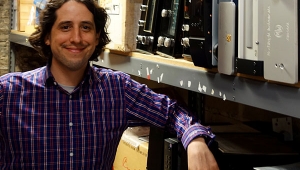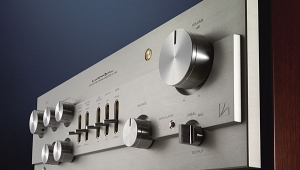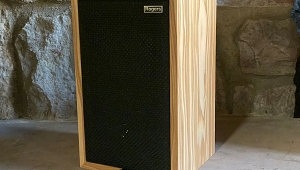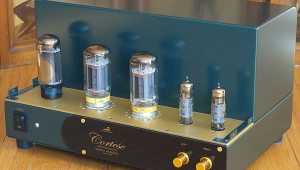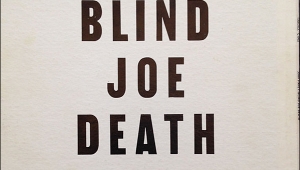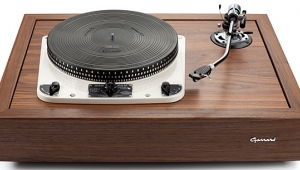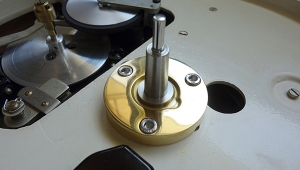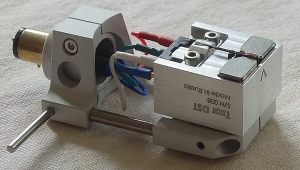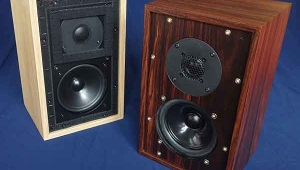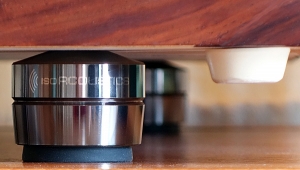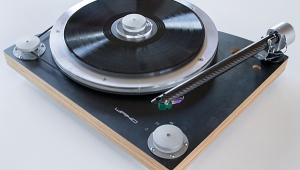| Columns Retired Columns & Blogs |
Listening #44 Page 2
Listen twice, boast once
Granted, this isn't Psychology Today, and I haven't the remotest idea why some people (footnote 3) are driven to prevent others from enjoying audio in their own harmless ways, any more than I can explain why some people bring the same crusader fixation to such disparate fields as dietary supplements, tropical fish, and religion. It simply appears that, no matter how socially inert the sin, there will never be a shortage of people whose sole pleasure is in haranguing the sinners. Not punishing, mind you. Not rehabilitating. Just amusing themselves with public taunts.
Footnote 3: Please note that I did indeed say some. To paraphrase John Stuart Mill: It isn't true that all of the woodies are pugnacious, imperious dickweeds, but it is true that all pugnacious, imperious dickweeds—or at least the ones who are audiophiles—are woodies.
Granted, this isn't Psychology Today, and I haven't the remotest idea why some people (footnote 3) are driven to prevent others from enjoying audio in their own harmless ways, any more than I can explain why some people bring the same crusader fixation to such disparate fields as dietary supplements, tropical fish, and religion. It simply appears that, no matter how socially inert the sin, there will never be a shortage of people whose sole pleasure is in haranguing the sinners. Not punishing, mind you. Not rehabilitating. Just amusing themselves with public taunts.
At no time is that more true than when the topic turns to double-blind testing. I have nothing against DBT, and I believe with all my heart that anyone who likes it or needs it or otherwise feels compelled to engage in it should simply do it—just the same as with people who want to smoke pot, collect firearms, marry a person of the same sex, express an unpopular opinion, or worship the devil, none of which is harmful to society in and of itself. People should be free to do whatever they want to do, just as long as it doesn't hurt me, my family, or the environment. Go ahead and get on with your bad selves.
Of course, I know it's unrealistic to cast things in quite that way, not to mention dishonest and a little bit nasty. It's as if I went to my daughter, an only child, and said, "Julia, just to prove what a generous and kindhearted daddy I am, you have my permission to play badminton for the entire afternoon while I'm in my office working on this column"—and then walked away. After all, the whole point of double-blind testing among audio consumers is merely to disprove the other side: It exists for no other reason. And like most other games, it isn't any fun if you can't get anyone else to play it with you.
But one man's idea of fun is another man's tedious waste of time. Speaking only for myself, I doubt very much that an activity based on switching rapidly back and forth between different components has even the slightest relevance, if only because I don't listen to music that way. Might I be able to detect sonic differences between components in that way? I suppose so. Could I detect musical differences—differences in timing, pitch, intensity, momentum, those sorts of things—between samples using that method? Probably not.
More to the point, I feel no particular motivation to try, no need to "prove" myself to anyone else, any more than I'm inclined to sing in a barbershop quartet, go skydiving, or watch an episode of Lost.
But that puts me back in the land of Akbar and Jeff:
"Why don't you prove your Lamm ML2.1 amps are as good as you say they are by comparing them with another amplifier in a double-blind test?"
"Because I don't think I need to."
"Well, I think you need to."
"That's nice. Are you considering buying a pair?"
"No, they're only for rich idiots."
"You're certainly free to think so."
"You're afraid you won't be able to prove that you can tell any difference."
"Well, I may or may not be able to 'prove' it to the satisfaction of someone else, but that's not important to me. I'm confident in my ability to hear the sorts of differences I consider important, and to describe them accurately enough."
"If you won't prove your findings in a double-blind test, why should anybody take your reviews seriously?"
"I suppose they shouldn't—at least the ones who feel the need for me to do that sort of thing."
"You don't care what your readers think?"
"I didn't say that. I said that if there are people who don't feel inclined to take my word when I review a product, then those people shouldn't read my reviews. It would be a waste of their time."
"That means you don't care what your readers think."
"I don't know why you insist on twisting my words."
"That's character assassination! Stop assassinating my character!"
"Sigh..."
Measure once, write twice
By this point you may have assumed that I hold specifications, measurements, and double-blind tests in utter contempt. Nothing could be further from the truth. (Well, it is true as far as DBTs are concerned, but only because their ratio of tedium to relevance is so far off the scale.)
Speaking purely as an enthusiast, I enjoy reading about measurements for all the same reasons that I enjoy reading about how things work. I'm curious. I'm analytical. And I'm easily bored—especially by audio reviewers who devote thousands upon thousands of words to turgid descriptions of spatial performance and timbral colorations and nothing else.
And I'm fascinated by the challenges of developing and carrying out relevant, repeatable tests: What's happening inside a preamp when it's playing music well—or poorly, for that matter? How can I tell that a turntable is actually storing too much resonant energy? What simple, electrical behavior can I observe in a loudspeaker that will predict how it may interact with an amplifier—or with the volume of air in an average living room? What physical property is it that allows those expensive magic pebbles to make the subway trains running underneath Kingsway Hall so delightfully audible? (Just kidding.)
If a playback phenomenon is real, then we should be able to describe it with a measurement that's equally real. In some instances, we may have to wait until our technical abilities grow deeper and more refined, just as it took a great deal of time and effort to comprehend certain single-cell life forms that have been around for millions of years (or 6000 years, if that makes you feel better). In other instances, we're already there—as with the questions surrounding the relationship between amplifiers and loudspeakers. (Ohm's Law isn't merely poetic: It is poetry itself.) The fact that I remain unconvinced of the relevance of certain other common measurements to the sorts of things I care about and listen for doesn't mean we should not, as an industry, keep trying.
And I suppose that, as with so many other things, the debate isn't about what it seems to be about. When you ask whether or not a magazine should measure equipment, what you're really asking is: Why do people read hi-fi magazines in the first place? What do they expect to get out of them?
If one were to view the audio magazine as a buyer's tool along the lines of Consumer Reports—a source of information whose usefulness is realized only when a shopper turns to it for purchasing advice—then the need for measurements completely falls apart: The audio newcomer doesn't know what they mean, and the audio veteran has heard enough products that don't correlate with the specs that he or she will dismiss them out of hand. Game over, dude.
But when you look at the audio magazine as a source of entertainment for the deeply interested and engaged enthusiast, the usefulness of measurements goes way up—and the nature and need for the testing regimen perforce becomes more refined and narrow.
So we carry on: We refine and we narrow. We make lots of mistakes, we miss lots of opportunities...and we sometimes get it all right. And at the end of the day, for now at least, I'm proud that Stereophile remains a unique blend of fuzzy and woody: a marvelous toy.
Consumer alerts
I have two bits of news to pass along:
I'm sorry to say that the English audio designer Keith Monks, who has been mentioned in this space a number of times, passed away late last year. Mr. Monks was a resourceful and, by all accounts, kindly man who left a legacy of many fine domestic and professional audio products, including the first commercially viable record-cleaning machines (see "Listening," March 2005).
Shortly after its founder's passing, Keith Monks Audio, Ltd. ceased all manufacturing and sales activity, but I've been told by two sources that one of Mr. Monks' children has been persuaded to reorganize and ultimately reopen the business, and that parts and completed record-cleaning machines may once again be available by the time you read this. KMAL enthusiasts here in the US are encouraged to contact distributor Audio Restoration by Graham Newton for details on availability.
In news that will confound the expectations of those readers who believe that big, established companies provide better after-sale service than tiny, fuzzy ones, as well as those who believe that big-shot audio reviewers get special treatment from the industry, I'm sorry to say that the carton for my Sony SCD-777ES continues to be held hostage at a Sony repair facility in Texas. I had the out-of-warranty SACD player repaired last year after it began making groaning noises and subsequently ceased recognizing discs as discs. But after I paid the bill, the repair facility merely wrapped the player in Bubble Pak and shipped it to me in a plain cardboard box. I don't know whether my original carton and packing have gone missing (hi, Bill), because Sony Repair has declined to respond to any of my several polite e-mails on the subject.
As most of you know, the lack of an original carton can diminish the value of an audio component in case you wish to sell or trade it in the future. When selecting a repair facility, make sure they're sensitive to that fact, and that they have your total satisfaction in mind.
Footnote 3: Please note that I did indeed say some. To paraphrase John Stuart Mill: It isn't true that all of the woodies are pugnacious, imperious dickweeds, but it is true that all pugnacious, imperious dickweeds—or at least the ones who are audiophiles—are woodies.
- Log in or register to post comments
